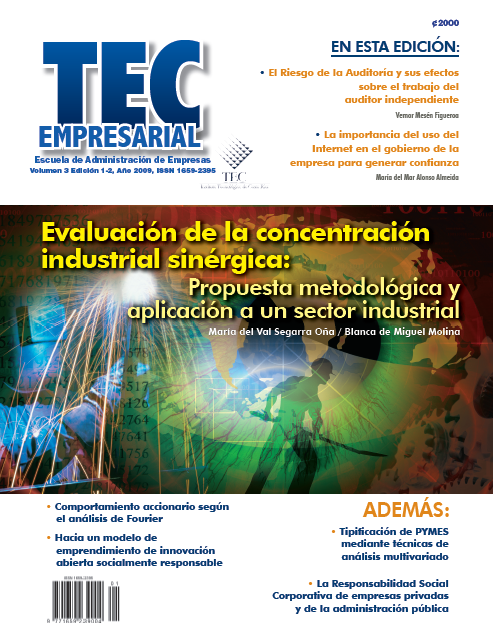El Riesgo de Auditoria y sus Efectos sobre el Trabajo del Auditor Independiente
Main Article Content
Abstract
En un contexto mundial donde la información financiera se haconvertido en uno de los principales insumos, tanto para el desarrollodel comercio internacional como para la toma de decisionesfinancieras y económicas, resulta de suma importancia que lascifras de los estados financieros de toda entidad presenten, de formarazonable, la posición financiera, los resultados de operación y losflujos de efectivo de éstas. Es así como durante las últimas décadas,el trabajo de los auditores independientes ha venido tomando unaenorme transcendencia en vista de que, cada vez más, sus opinionesindependientes otorgan credibilidad y validez a la informaciónfinanciera de toda entidad, la cual es tan requerida por entidadesbancarias, accionistas, gobierno y público en general. El presenteestudio pretende reseñar cuál es la naturaleza del trabajo del auditorindependiente y, por ende, cuáles son los pasos que éste debe seguirpara desarrollar una auditoria de estados financieros. De igual forma,se analiza el concepto de riesgo de auditoria, sus componentes ylos efectos que dicho riesgo tiene sobre la naturaleza, extensión yoportunidad de las respuestas globales, pruebas de control y pruebassustantivas que un auditor independiente desarrolla con el propósitode determinar la razonabilidad de las cifras de los estados financierosde una entidad. Finalmente, se presentan guías de carácter general yespecífico que sirven de elemento orientador para que los auditoresindependientes estén en capacidad de desarrollar procedimientosde auditoria los cuales les permitan realizar trabajos de auditoriafinanciera con niveles de riesgo de auditoria aceptablemente bajos.
ABSTRACT
In the global environment where financial informationhas become a main ingredient both to international tradedevelopment and to financial and economic decision making,it is of paramount importance that the financial figures in thefinancial statements of corporations reasonably show theirfinancial position, operating results and cash flows. It is so thatduring the last few years the independent auditor work has beenacquiring an enormous importance, in view that more and moretheir independent views provide credibility and validity to thefinancial information from any entity that third parties such asbanks, shareholders, governments and general public require.This study aims to abridge the nature of the independent auditorwork and therefore the steps he/she must follow to develop anaudit of financial statements. In a like manner, it analyzes theconcept of audit risk, its components and the effects that suchrisk has on the nature, scope and opportunity of global answers,control tests and balance check tests that an independent auditordevelops in order to establish the rationality of the figures in acorporation financial statement. Finally, general and specificguidelines are presented to help independent auditors developauditing procedures that will allow them to perform financialaudits with acceptably low audit risks.
Article Details
The digital version of the journal is registered under the BY-NC-ND 4.0 Creative Commons license. Therefore, this work may be copy and redistribute the material in any medium or format, as long as you give appropriate credit, provide a link to the license, and indicate if changes were made. You may do so in any reasonable manner, but not in any way that suggests the licensor endorses you or your use.
The authors keep the copyright and give the journal the right of the first publication and the possibility of editing, reproducing, distributing, exhibiting and communicating in the country and abroad through printed and electronic means. On the other hand, the author declares to assume the commitment on any litigation or claim related to the rights of intellectual property, exonerating of responsibility to the Business School of the Costa Rica Institute of Technology.


